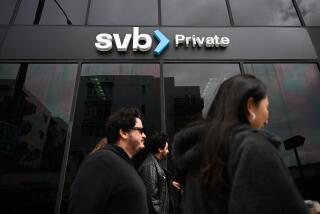‘The Savings Scandal’
- Share via
The editorial “The Savings Scandal” (Jan. 12) is a well-intended analysis of the crisis facing the federal deposit insurance system. However, the editorial leaves the misguided impression that the nation’s surviving, well-run savings institutions have not paid their fair share in trying to resolve the funding shortfall of the Federal Savings and Loan Insurance Corp. and that they can afford to increase their support of the FSLIC. In fact, quite the opposite is true.
Over the past two years, savings and loans have paid more than $4 billion in special assessments to the FSLIC and had their investment of $823 million in the FSLIC secondary reserve taken away by fiat. And through their ongoing contributions to the FSLIC, the savings and loans are responsible for covering FSLIC’s recent outlay to resolve the worst problem cases.
The special assessment you suggest enlarging already causes thrifts to pay 2 1/2 times more for deposit insurance than commercial banks. This very special assessment was responsible for pushing more than 100 otherwise healthy institutions into insolvency in 1987.
Moreover, why should Great Western or Home Savings of America, two of the strongest financial institutions in the nation, pay more for deposit insurance than Bank of America or Continental Illinois? These and 2,000 other healthy savings institutions in America continue to focus their lending activity on residential mortgages, among the safest of all investments--not loans to foreign governments or to corporate raiders cashing in on the leveraged-buyout craze.
Your conclusions, regrettably, are based on false assumptions. The broad diversification of savings and loans away from their historic mortgage financing function simply did not happen as you suggest. In fact, today only 2% of savings and loan assets are in non-real estate commercial loans, while 62% of assets are in residential mortgages--a number that has not changed in several years.
We also agree with you that there is no obligation to bail out investors, stockholders or failed managers. The public obligation is to protect the depositor, as the Congress has guaranteed.
The California League of Savings Institutions agrees with The Times that every effort should be made to ensure that the crisis facing the federal deposit insurance system is not allowed to occur again, and we are actively pursuing every avenue to help resolve this crisis. We fundamentally believe, however, that it is poor public policy--and not in the public interest--to break the backs of healthy, profitable savings institutions to achieve this resolution.
PATRICK H. PRICE
Chairman
California League of
Savings Institutions
Los Angeles
More to Read
Inside the business of entertainment
The Wide Shot brings you news, analysis and insights on everything from streaming wars to production — and what it all means for the future.
You may occasionally receive promotional content from the Los Angeles Times.










